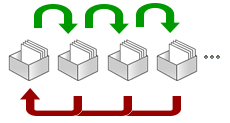Flashcard
From Wikipedia, the free encyclopedia
A flashcard or flash card is a card that is used as a learning aid. One writes a question on a card and an answer overleaf. Flashcards can bear vocabulary, historical dates, formulas or any subject matter that can be learned via a question and answer format. Flashcards are widely used as a learning drill to aid memorization by way of spaced repetition.
[edit] Leitner System
A widely used method to efficiently use flashcards was proposed by the German science popularizer Sebastian Leitner in the 1970s. In his method, known as the Leitner system, flashcards are sorted into groups according to how well you know each one in the Leitner's learning box. This is how it works: you try to recall the solution written on a flashcard. If you succeed, you send the card to the next group. But if you fail, you send it back to the first group. Each succeeding group has a longer period of time before you are required to revisit the cards.
For example, suppose you have 3 groups called Group 1, Group 2 and Group 3. The cards in Group 1 are the ones that you often make mistakes with, and Group 3 contains the cards that you know very well. You might choose to study the Group 1 cards once a day, Group 2 every 3 days, and the Group 3 cards every 5 days. If you look at a Group 1 card and get the correct answer, you "promote" it to Group 2. A correct answer with a Group 2 card "promotes" that card to Group 3. If you make a mistake with a Group 2 or Group 3 card, it gets "demoted" to Group 1, which forces you to study that card more often.
The advantage of this method is that you can focus on the most difficult flashcards, which remain in the first few groups. The result is, ideally, a reduction in the amount of study time needed.
Similar ideas have been implemented into a number of computer-assisted language learning titles. Much of this software makes use of so-called electronic flashcards.


